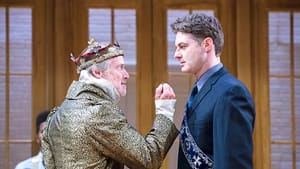Stay in the Loop
BSR publishes on a weekly schedule, with an email newsletter every Wednesday and Thursday morning. There’s no paywall, and subscribing is always free.
"Problem play" in more than one sense
Pennsylvania Shakespeare Festival presents 'All's Well that Ends Well' (first review)

The Pennsylvania Shakespeare Festival (PSF) concludes its 27th season with the "problem play" All's Well That Ends Well. It's the company's eighth Extreme Shakespeare production, designed to duplicate the rehearsal methods Elizabethan actors used (we think).
The approach, also called "original practice" and, in actor Eric Hissom's preshow speech, "hit-and-run Shakespeare," forgoes the relatively modern habit of a four-week director-conducted rehearsal period and specific physical production values created by designers of scenery, lighting, costumes, properties, and sound.
Instead, actors show up four days before the first performance with their lines learned, working together to stage the play, raiding the theater's storage for clothing, props, and furniture, and using the set and lighting left by other productions (this year, PSF's Twelfth Night and the children's show Alice in Wonderland).
Cynics might say this cuts costs when PSF produces a lesser-known Shakespeare play — but if that's what it takes to do these plays, it's worth it. More importantly, the Extreme Shakespeare shows have been consistently well-acted, dynamically staged, and satisfying for audiences.
Other than that, how's the play?
The gender politics of All's Well That Ends Well infuriate many people and make no new fans in this #metoo era. When modest maid Helena (Emiley Kiser) cures the sickly King (Greg Wood), he offers her a choice of the kingdom's eligible young men to marry. She's been secretly in love with shallow Bertram, Count of Rossillion (Spencer Plachy), but he reacts with disdain. "A poor physician's daughter, my wife?"
In theater and in life, women have been given to men in political or financial transactions, so this turnaround seems a refreshing surprise. Bertram obeys but soon escapes to distant wars, dumping his bride in a letter with an impossible challenge: "When thou canst get the ring upon my finger, which never shall come off, and show me a child begotten of thy body that I am father to, then call me husband; but in such a 'then' I write a 'never.'"

The play leaps forward several years to show a more decisive Helena hatching a plot to make this happen, but Shakespeare reveals little about how her heartbreak turns to resolve.
Meanwhile, a subplot about braggart Parolles (Jim Helsinger) getting his comeuppance through a plot to expose his lies generates many laughs. Director Dennis Razze might have struck a better balance between this relatively slight story — which feels like a rough draft of Malvolio's torment in Twelfth Night — and Helena's dramatically rich and complicated tale.
A debatable ending
An exciting revelation scene shows Helena; co-conspirator Diana (Stephanie Hodge); and Bertram's mother, the Countess (Susan Riley Stevens), who wholly supports Helena, scrutinized by the doubting King and other male judges. Once Helena meets Bertram's conditions, Shakespeare's happy ending feels contrived.
I'm not sure it can be any other way, especially today. Bertram's cruel dismissal of Helena cannot be erased by a quick change of heart that seems motivated less by love than by deference to the king.
A director might clarify Bertram's newfound maturity and affection or stress Helena's growing strength and independence. These actors are tasked with presenting the text, which they do with clarity and insight, rather than taking a united stand about its themes.
The issues, therefore, are punted to the audience: Does Shakespeare's "happy" ending betray the play's strong female characters? Can Helena and Bertram really be in love after all that's passed? Does the play tell us that women are nearly always helpless, or that men are inevitably callous and hapless?
See All's Well that Ends Well and prepare for a lively debate.
To read Cameron Kelsall's review, click here.
What, When, Where
All's Well that Ends Well. By William Shakespeare. Through August 5, 2018,at the Pennsylvania Shakespeare Festival, 2755 Station Avenue, Center Valley, Pennsylvania. (610) 282-9455 or pashakespeare.org.
Sign up for our newsletter
All of the week's new articles, all in one place. Sign up for the free weekly BSR newsletters, and don't miss a conversation.

 Mark Cofta
Mark Cofta